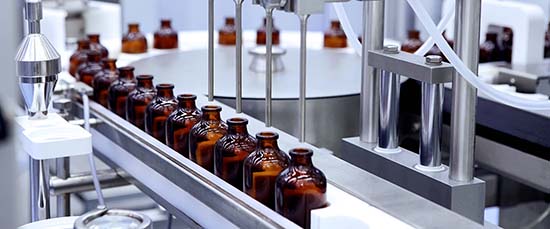Modern pressure measurement technology – a must in the pharmaceutical industry
For the production and packaging of active ingredients in the pharmaceutical industry, hygiene is an important factor in determining the purity and efficacy of medications. Production therefore takes place in defined hygienic areas. A stable overpressure prevents the penetration of particles from adjacent production areas. Differential pressure transmitters can be used for overpressure control in hygiene rooms
Whether the tablets or powders are packed in blister, glass or plastic containers, whether serums are filled into phials, syringes or glass bottles – the production environment must meet the highest standards of cleanliness at all times.
The state-of-the-art processes and packaging machines used by the pharmaceutical industry offer various possibilities for creating such a production environment. The first option is to place the entire production line in a traditional cleanroom. The second is to use a series of separate, sterile hygiene cabins. The third possibility is to use delimited areas – or so-called “mini environments”– within the machine for sensitive stages of production. Each of these three options ensures that individual process steps, such as bottling or packaging, take place under cleanroom conditions.
Maintaining stable overpressure
In these sensitive production areas, the supply and exhaust air are regulated and monitored. A controlled, stable overpressure prevents particles entering the cleanroom from adjacent production areas. Filter systems ensure the supply air is perfectly cleaned.
The requirements for the production facility are specified by statutory requirements and a range of national and international standards. These are supplemented by behaviour and clothing regulations for employees. Sensitive pressure measurement technology is usually required to maintain the stable overpressure within the prescribed range. The ventilation system filters are also monitored by differential pressure transmitters. This is important for ensuring that there is a reliable air supply for controlling the overpressure and that the system operates efficiently using the minimum energy. Pressure measurement technology is thus part of an overall control system that regulates and monitors all fans, air distributors and air filters.
To maintain a constant overpressure, a differential pressure transmitter continuously measures the pressure difference between the sensitive production environment and surrounding production areas. The smallest changes in air pressure are translated into an electrical signal and passed on to the control system.
As soon as the pressure difference falls below a specified value, or if there are major fluctuations, the control system issues a warning to higher level systems or initiates a controlled interruption of production. Production is halted and a servicing operation begins. Once the root cause has been discovered and remedied, the prescribed production conditions must be re-established before production can resume. For the plant operator, this is a costly and time-consuming process that results in significant loss of production.
